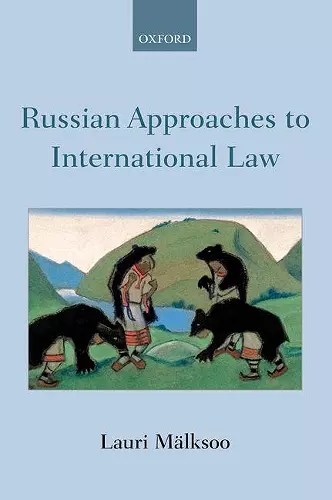Russian Approaches to International Law
Format:Paperback
Publisher:Oxford University Press
Published:23rd Mar '17
Currently unavailable, and unfortunately no date known when it will be back
This paperback is available in another edition too:
- Hardback£125.00(9780198723042)

This is an open access title available under the terms of a CC BY-NC-ND 4.0 International licence. It is free to read on the Oxford Academic platform and offered as a free PDF download from OUP and selected open access locations. This book addresses a simple question: how do Russians understand international law? Is it the same understanding as in the West or is it in some ways different and if so, why? It answers these questions by drawing on from three different yet closely interconnected perspectives: history, theory, and recent state practice. The work uses comparative international law as starting point and argues that in order to understand post-Soviet Russia's state and scholarly approaches to international law, one should take into account the history of ideas in Russia. To an extent, Russian understandings of international law differ from what is considered the mainstream in the West. One specific feature of this book is that it goes inside the language of international law as it is spoken and discussed in post-Soviet Russia, especially the scholarly literature in the Russian language, and relates this literature to the history of international law as discipline in Russia. Recent state practice such as the annexation of Crimea in 2014, Russia's record in the UN Security Council, the jurisprudence of the European Court of Human Rights, prominent cases in investor-state arbitration, and the creation of the Eurasian Economic Union are laid out and discussed in the context of increasingly popular 'civilizational' ideas, the claim that Russia is a unique civilization and therefore not part of the West. The implications of this claim for the future of international law, its universality, and regionalism are discussed.
The questions Lauri Mälksoo raises in his book are interesting and important to the members of Russian and non-Russian academic community alike. Hopefully, more research projects will emerge as a result, with this book as a starting point for a fruitful debate not only among legal scholars, but among historians, political scientists, sociologists and representatives of other disciplines as well. * Sergey Y. Marochkin and Galina A. Nelaeva, Chinese Journal of International Law *
Lauri Mälksoo's study is very critical and open; it shows and explains differences and provides interesting insights into the most recent developments in Russian practice and thinking. His concise and well-written book fills an important lacuna in the meta-analysis of present-day international law doctrine. As he takes Russian international law seriously, his analysis has to be taken seriously as well. It can serve as a starting point for further debate. * Angelika Nußberger, European Journal of International Law *
Mälksoo has achieved a similar feat of success to that of what Martens did for Tsarist Russian international law - exposing it to the world. * P. Sean Morris, German Yearbook of International Law *
Mälksoo has made a worthy contribution to comparative international law and to our understanding of our Russian colleagues. * William E. Butler, American Journal of International Law *
For any reader with the slightest interest in the role the Russian Federation plays in the contemporary development of international law, this book is a treasure house of engaged argumentation and extraordinary erudition. Mälksoo has an unrivalled knowledge of the Russian language scholarly literature, much of which is unknown outside the Russian-speaking world. The book is resolutely up to date and starts and finishes in the present day. * Bill Bowring, British Yearbook of International Law *
The questions Lauri Mälksoo raises in his book are interesting and important to the members of Russian and non-Russian academic community alike. Hopefully, more research projects will emerge as a result, with this book as a starting point for a fruitful debate not only among legal scholars, but among historians, political scientists, sociologists and representatives of other disciplines as well. * Sergey Y. Marochkin, Galina A. Nelaeva, Chinese Journal of International Law *
Mälksoo's book represents an important and intelligent contribution to the further development of the field of international law, in particular comparative international law, as well as, among other things, the underdeveloped discussion on the connection between the reception of international law and the state of domestic law. In conclusion, the book and what it represents deserves our attention. * Mikael Baaz, International Journal of Constitutional Law *
Lauri Mälksoo shall be praised for this book. It is the result of a thoughtful research which will serve as a perfect starting point for anyone who wants to understand Russia in terms of international law. The book is also essential for Russian legal scholars, providing them with respectful but critical reflections. * Gleb Bogush, Russian Law Journal *
This analysis of Russian scholarship of international law is an invaluable guide for those who write about Russian international policies and the intellectual backgrounds behind these policies. * Mikhail Antonov, Review of Central and East European Law *
Mälksoos analysis of contemporary Russian academic community in the field of international law is profound and based on the authors own observations. He demonstrates excellent knowledge of the Russian literature in the field of international law. * Nordic Journal of International Law *
- Winner of Honourable Mention for the 2016 ASEES Marshall D. Shulman Book Prize.
ISBN: 9780198808046
Dimensions: 234mm x 155mm x 13mm
Weight: 370g
238 pages